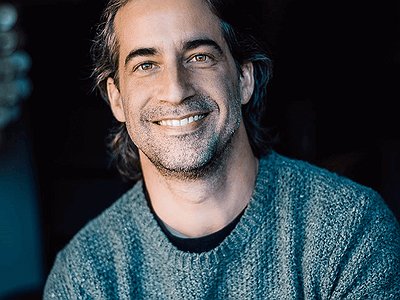Part 1
Name: Jamie Forsyth
Nationality: Canadian
Occupation: Film Composer
Selected scores: Medium, Bones, The Confession, Elementary, 24:Legacy
Recommendations: I have to admit to being a bit of a non-fiction nerd. I’m currently, and seemingly perpetually, rereading various Bill Bryson books (at the moment “One Summer: America, 1927”) as I find him to be endlessly amusing and I often find I need some blatant amusement in my life. I have also recently discovered a podcast by Nadia Sirota called Meet The Composer where I’ve really been enjoying discovering so many new and brilliant and inventive composers from all kinds of differing corners of the composing world. If you have a passion for music and modern composers then this should not be missed.
If you enjoyed our interview with composer Jamie Forsyth, you can find more information about him at his website.
When did you start composing film music - and what or who were your early passions and influences? What is it about music and/or sound that drew you to it?
For some reason music was just something I got the hang of. I just understood it. Relatively late in life I would say, I didn’t really find music until high school. I think my attraction to music was being able to organize something from start to finish - a complete thought, a fully realized thing - before pushing it out into the world. I guess it’s a control freak thing maybe? Wanting to be sure your intent is understood. I’m sure you’ve heard many an artist fairly break out into hives at the thought of their in-progress unfinished work seeing the light of day, I guess I sometimes just felt that way about life in general. Creating music gave me end to end control of the final result.
For most artists, originality is first preceded by a phase of learning and, often, emulating others. What was this like for you? How would you describe your own development as an artist and the transition towards your own voice? What is the relationship between copying, learning and your own creativity?
I still emulate. I still admire. (Sometimes I envy too and those are never good days!) I think it’s a critical aspect of creativity. Building on someone else’s thing or style or ideas. There is of course, in our day and age, a raging debate over sampling and stealing and that’s not what I’m talking about at all. I just mean that even if you were emulating someone else it’s likely going to come out sounding like you anyway. But you might learn something, some trick, some insight, and widen your world a bit.
What were your main compositional challenges when starting out as a film composer and how have they changed over time?
I think the biggest thing, apart from the artistic / dramatic lessons I needed to learn, was just the technological aspects of creating fully matured scores, orchestral and otherwise, with, essentially, just a couple of rooms full of computers and microphones. These days being a “composer” means a lot more than manuscript, paper and a piano. It means facility with software, with computer hardware, all kinds of technical know-how and being a multi-instrumentalist is also a huge huge help. Along with advancing technology has also come advancing expectations. The lone tv composer today is not just a musician, an arranger, an orchestrator, but he is also a programmer, a sound engineer, a mixing engineer. The knowledge base is very diverse and you need to be comfortable switching gears from right to left brain and back again seamlessly and constantly.
What, to you, are the main functions and goals of soundtracks and film music and how would you rate their importance for the movie as a whole? How do you maintain a balance between, on the one hand, artistic integrity and sticking to your creative convictions and, on the other, meeting the expectations of the director?
I suspect almost all film composers have been guilty at one time or another of getting a little too attached to their own work; being a little too dazzled by their own brilliance only to have a producer or directer shoot you down in flames. It’s a horrible feeling. You suddenly feel like you’re in the this creative cul de sac wondering “what else can I write here?”. It’s always the times that I forget that the story comes first, that the characters are more important than the music, that I get myself into that place. In tv and film the music is really there in support of the other elements and it’s important not to try to push your way to the front, so to speak. Conversely there are these wonderful times when you shoot an arrow into the forest and really try something different and ‘out-there’ and it resonates with the creative team. But “artistic integrity”, I’ve always thought, is an unfortunate term. It suggests that the only creative philosophy worth subscribing to is: “I have the right to do whatever I want” and somehow if you don’t have the freedom to exercise your slightest whim then somehow you have failed to reach the brass ring as an artist. The tv + film world just doesn’t work that way. It’s always a collaboration. So much of art is collaboration or commission. Young and aspiring artists who like to throw around the term “artistic integrity” recklessly seem to forget that so many of the masterpieces we all know and recognize as timeless were commissions and existed at the pleasure of a overseer. Mozart, Michaelangelo, Gehry, etc. Artists just trying to pay the bills or please the king or feed the kids. And there is great integrity, I think, in finding the director’s voice and amplifying it and improving it and still finding space in there to be yourself and make your voice heard.
What was your first studio like? How and for what reasons has your set-up evolved over the years and what are currently some of the most important pieces of gear for you?
My first “studio”, laughably called, was a simple keyboard workstation that I had with me while I was working on a cruise ship for two years. Just a tiny LCD screen and analog synthesis. Now, nearly 20 years later, I hate to even imagine how many times all the studio cabling would circle the equator. But the complexity of the whole system is, as much as anything, out of a need to move quickly and have everything available to me at once right up until the last possible moment of creation. So every sound is loaded, every microphone is ready to record, every instrument and every sound has it’s own separate environment where it can be manipulated and tweaked independent of everything else. It’s a nimble and versatile setup but I don’t mind admitting it can be unwieldy as hell sometimes and glitches always seem to strike at the worst moments. Computers can be vindictive and petty things. Usually at one in the morning on a Saturday.
How do you make use of technology? In terms of the feedback mechanism between technology and creativity, what do humans excel at, what do machines excel at?
Technology is really an instrument unto itself to me. Some people think of technology as a means of building something they have conceived in their mind, I definitely use technology to generate ideas, to take risks. It’s a bit like being a cyborg, the available technology does so many things that are just beyond the brain’s ability to imagine. Of course it’s not exclusively like that, a huge amount of the composition happens internally (sometimes at a traffic light or during a nap), but certainly I make use of technology to surprise me, to inspire me, to launch me off in unexpected directions.
Production tools, from instruments to complex software environments, contribute to the compositional process. How does this manifest itself in your work? Can you describe the co-authorship between yourself and your tools?
There is no doubt that without the studio-as-an-instrument model I don’t know if I would be doing this work. For me the tactile experience of trying things and throwing things out and starting again and tweaking and fiddling… it’s all very much a part of the process. It’s not like I sit down with a pen and a pencil and write out this fully realized score and then set about recording it. The recording is so much a part of the building process. Sometimes a cue will come from a melodic idea. Sometimes I lean on the keyboard in a particular way and a strange blrrrrrt comes out because I had some odd instrument loaded at the time and something is born of that. I’ve kept piano plinks and plonks that my cats created whilst wandering in and out of the studio (and onto the keyboard) while I was recording.
Collaborations can take on many forms. What role do they play in your approach and what are your preferred ways of engaging with other creatives through, for example, file sharing, jamming or just talking about ideas?
I love collaboration. While it can be fun to bring a project into the world myself, on my own, and all the pride in accomplishment that entails, the collaborative process is so much a part of what music is about for me. There is nothing quite like the anticipation of seeing how another artist responds to your contribution and then the sinister joy of seeing what madness you can create with their work. The back and forth, trying to surprise and delight and engage with each other, what could be better than that?






